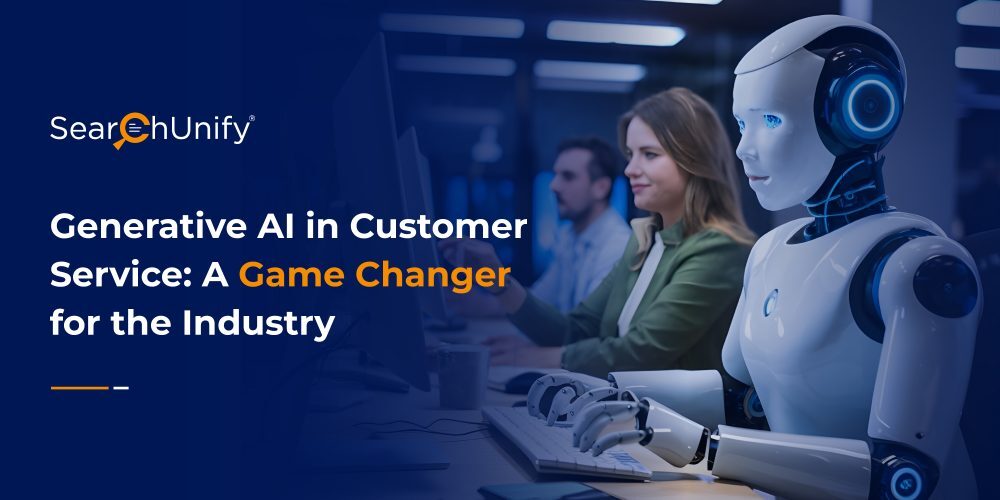
In today’s fast-paced world, delivering exceptional customer service is crucial for any industry. Customers demand quick, prompt, and effective answers to their queries. More so, they hate to wait and expect service to be delivered 24/7 across multiple channels. However, customer support teams are often grappling with an overwhelming influx of queries, leading to a pressing question: “Who supports those at the forefront of customer support?”
While traditional, rule-based AI approaches can tackle this challenge, they have their own set of limitations. Chatbots relying on rule-based or traditional machine learning algorithms can respond to only a set of known cases. While a scripted chatbot can handle simple queries, it often struggles with complex questions, leading to a frustrating experience for customers.
On the other hand, Generative AI has the potential to revolutionize the customer service landscape.
Understanding Generative AI
Unlike other types of AI that follow predefined rules, Generative AI uses Large Language Models (LLMs) and deep-learning models to understand complex queries and generates more personalized, contextual, and human-like responses to enhance customer experience. In the next section of this blog post, we will delve into the potential applications of Generative AI in customer service and support.
Applications of Generative AI in Customer Service
Generative AI is finding its way into various aspects of customer service, reshaping how businesses interact with their customers. Here’s how:
1. Employ Generative AI for Conversational Search and Answers
By leveraging LLMs and Generative AI technologies, users can quickly find the answers to their queries in a conversational way from various content repositories and knowledge bases across the enterprise. This allows customer support executives and agents to resolve customer queries faster, accelerate resolution times, and deliver delightful customer experiences.
2. Employ Generative AI for Case Summarization
Customer service agents spend a lot of time summarizing cases. But what if Generative AI could do that for them? Yep, it can! For customer support teams, case summarization using generative AI allows for the accurate creation of case summary notes in seconds, which agents can refer to in future customer interactions. This way, customer tickets and issues can be resolved much faster, freeing up agents’ time from repetitive manual tasks and boosting their productivity.
3. Employ Generative AI for Automated Support Ticket Labeling and Categorization
Sorting through customer tickets can be a tedious task. Generative AI steps in again! By analyzing past tickets, AI can learn to categorize new ones automatically. It can even prioritize them based on urgency, saving agents valuable time and ensuring critical issues get addressed first.
4. Leverage Generative AI for Intelligent Case Routing
Collaboration among support teams is enhanced through shared inboxes, allowing for the joint handling of customer conversations and the internal reassignment of discussions based on expertise or factors like previous customer interactions. Taking the case routing process to the next level, a generative AI model can autonomously allocate tickets to customer support agents considering factors such as:
- Queue workload and priority of cases
- Past customer engagements and cases solved by agent
- Customer sentiment and agent performance ratings
This optimization significantly enhances the efficiency of support operations, expedites time to resolution, and elevates the overall customer experience.
5. Leverage Generative AI for Knowledge Creation and Management
Self-service portals and FAQs have gained popularity as customers seek quick solutions to their problems. Generative AI takes self-service to the next level by creating comprehensive and accurate self-help articles. This not only reduces the workload of customer service agents but also empowers customers to find answers on their own terms.
Navigating the Challenges of Generative AI
While Generative AI holds immense potential to revolutionize customer service, there are certain limitations that pose a significant hurdle in achieving desired business outcomes.
One of the key challenges in implementing Generative AI in customer service is its propensity to generate inaccurate information, commonly termed as “hallucinations.” This issue occurs when the AI misinterprets data or produces unrelated responses, leading to confusion and potentially undermining customer trust.
To address this challenge, SearchUnify has developed a Virtual Assistant that never hallucinates. Unlike traditional AI models that rely solely on general data and pre-programmed responses, SearchUnify Generative AI-powered Virtual Assistant (SUVA) instantaneously fetches accurate, relevant, and up-to-date information directly from the company’s own resources. Powered by the innovative SearchUnifyFRAG™ framework, it is the world’s first federated, information retrieval-augmented virtual assistant that delivers fine-tuned, contextual, and intent-driven conversational responses at scale.
Transforming Customer Service with Generative AI
SearchUnify can assist you in harnessing the power of Generative AI for customer support and service through a suite of products and solutions. For example, customer support teams can automatically create, share, and reuse knowledge articles using Knowbler, enabling faster resolution of customer queries.
With the rollout of SearchUnify’s LLM-fueled Generative Question Answering, organizations can now take customer support, agent, and self-service experience to the next level. By Combining LLMs (Large Language Models) with its powerful enterprise search and relevance technology using the Federated Retrieval Augmented Generation (FRAG™) approach, it empowers customers, support agents, and knowledge workers with accurate and direct answers to complex queries, supported by relevant source links as the source of truth.
Additionally, the inclusion of Generative AI-powered functionalities like case summarization and auto-resolution suggestion features within Agent Helper significantly elevates agent performance, empowering them to deliver exceptional customer service.
Case Summarization
Auto-Resolution Suggestion
Conclusion
The advent of Generative AI into customer service heralds an exhilarating advancement, bringing forth unparalleled advantages alongside novel challenges. Its capability to deliver predictive, personalized, and innovative customer support is redefining industry standards. However, unlocking its full potential necessitates a careful and systematic strategy.
To explore how SearchUnify can assist you in achieving these capabilities and more, request a free demo today!